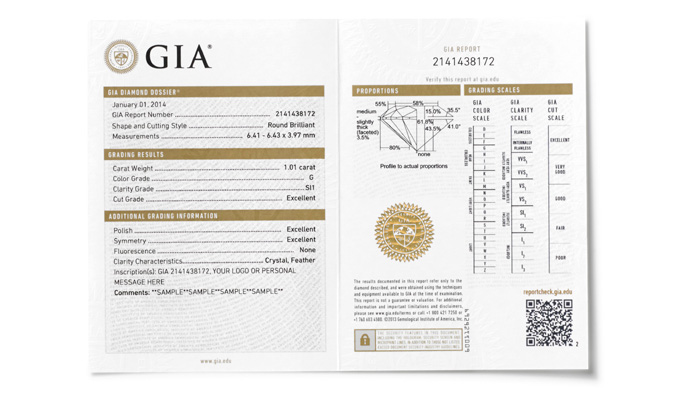
For more than 50 years, fine jewellers everywhere have considered the GIA Diamond Grading Report the premier credential of a diamond’s authenticity and quality.
GIA Diamond Grading Report
The GIA Diamond Grading Report includes an assessment of a diamond’s 4Cs – color, clarity, cut, and carat weight – along with a plotted diagram of its clarity characteristics and a graphic representation of the diamond’s proportions. For standard round brilliant cut diamonds falling in the D-to-Z colour range, the report also includes a GIA Cut grade.
The GIA laboratory issues diamond grading reports for loose, natural diamonds in the D-to-Z colour range that weigh 0.15 carats or more. GIA Diamond Grading Reports are not issued for laboratory-grown diamonds, diamond simulants, mounted diamonds or those that have undergone unstable treatments, such as fracture filling or coating. And while reports may be issued for diamonds that have been laser drilled or HPHT processed, reports will indicate that the diamond has been treated.

A GIA Diamond Grading Report includes an assessment of the 4Cs – Colour, Clarity, Cut and Carat Weight – along with a plotted diagram of its clarity characteristics and a graphic representation of the diamond’s proportions. The report also includes the official GIA grading scales for Colour, Clarity and Cut as reference tools.
Download How to Read a GIA Diamond Grading Report
New! GIA Diamond Origin Report

The new GIA Diamond Origin Report contains all the unbiased, accurate data of a Diamond Grading Report, plus GIA’s scientific determination of the diamond’s country of origin and a microscopic laser inscription of the report number on the diamond’s girdle. Image-rich, interactive materials accompany the report, telling the story of the diamond’s home country and the diamond’s journey from rough to polished state. Explore the GIA Diamond Origin Report.
GIA Diamond Dossier®

The GIA Diamond Dossier offers the same grading information as the GIA Diamond Grading Report but without the plotted diagram. As an added security feature, the Dossier service includes a microscopic laser inscription of the report number on the diamond’s girdle.
The GIA laboratory issues the Diamond Dossier for loose, natural diamonds between 0.15 and 1.99 carats, in the D-to-Z colour range. The Diamond Dossier is not issued for laboratory-grown diamonds, simulants, mounted diamonds, diamonds that have undergone unstable treatments such as fracture filling or coating, or those that have been HPHT processed. Any evidence of other treatment is disclosed in the report.
Also available are the GIA Diamond eReport and the GIA Diamond Focus Report™, online only reports including full 4Cs grading results.

The GIA Diamond Dossier® includes an assessment of the 4Cs – Color, Clarity, Cut and Carat Weight – plus a microscopic laser inscription of the GIA report number for easy identification in a smaller format.
Download How to Read a GIA Diamond Dossier
WHAT IS A DIAMOND LASER INSCRIPTION?

A laser inscription serves as a secure identifying feature, which links the diamond to its specific report data, via a report number that GIA inscribes on the diamond’s girdle. Viewable under 10× magnification with a simple jeweller's loupe, the inscribed report number can be matched to the diamond’s physical report or entered into GIA Report Check, GIA’s online database containing the diamond’s grading details. In addition to report numbers, GIA will also inscribe short messages or logos, upon request.
A report number laser inscription is automatically applied to all diamonds that come with either a GIA Diamond Origin Report, GIA Diamond Dossier, Diamond FocusTM report, or any GIA Laboratory-Grown Reports.




